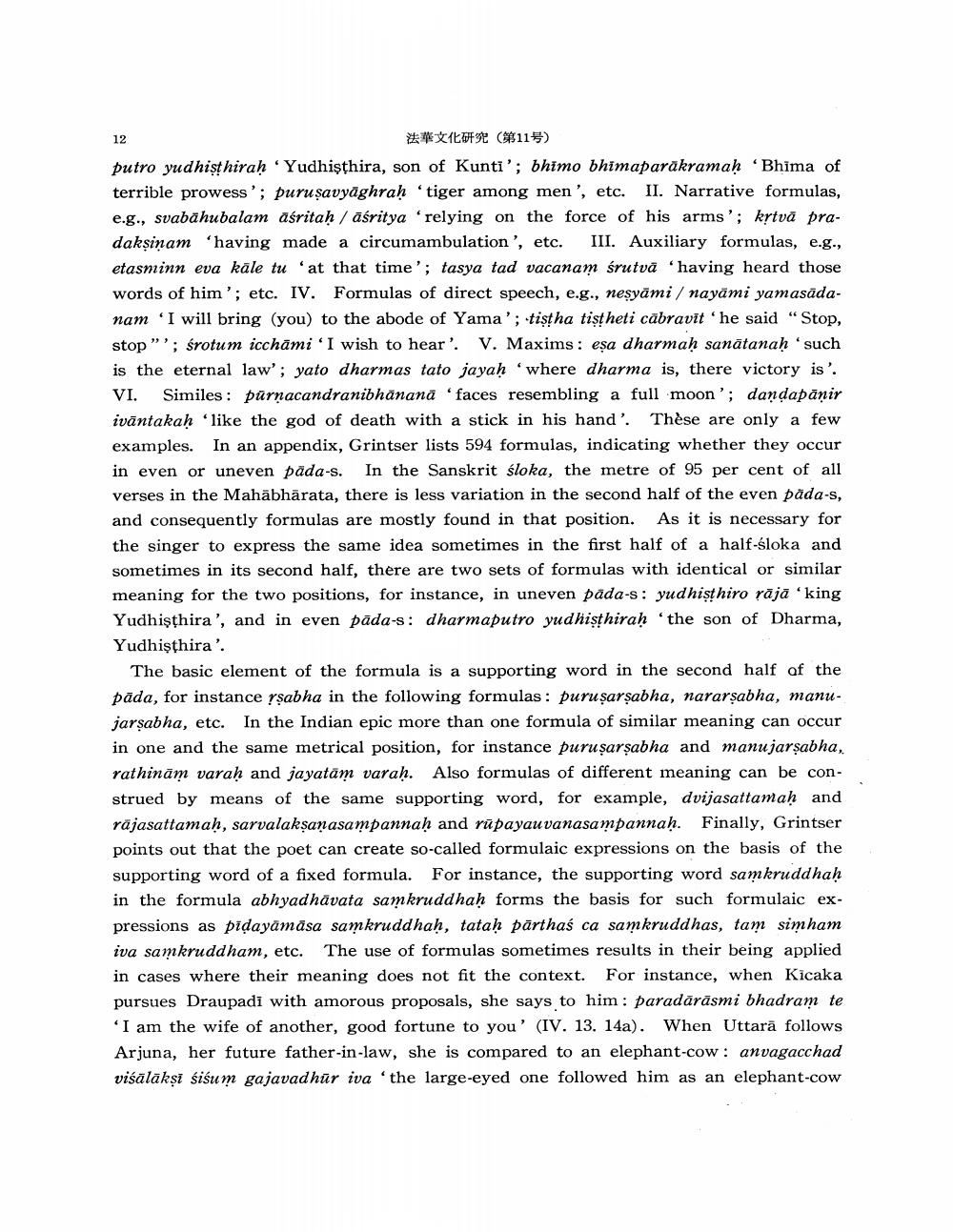________________
法華文化研究 (第11号)
putro yudhisthiraḥ 'Yudhisthira, son of Kunti'; bhimo bhimaparākramaḥ 'Bhima of terrible prowess'; puruṣavyaghraḥ tiger among men', etc. II. Narrative formulas, e.g., svabahubalam asritaḥ / aśritya 'relying on the force of his arms'; kṛtvā pradakṣinam 'having made a circumambulation', etc. III. Auxiliary formulas, e.g., etasminn eva kāle tu at that time'; tasya tad vacanam śrutvā 'having heard those words of him'; etc. IV. Formulas of direct speech, e.g., nesyāmi / nayāmi yamasādanam 'I will bring (you) to the abode of Yama'; tistha tistheti cabravit 'he said "Stop, stop "'; śrotum icchami 'I wish to hear'. V. Maxims: eșa dharmaḥ sanatanaḥ 'such is the eternal law'; yato dharmas tato jayaḥ where dharma is, there victory is'. VI. Similes pūrṇacandranibhananā 'faces resembling a full moon'; dandapāņir ivāntakaḥ 'like the god of death with a stick in his hand'. Thèse are only a few examples. In an appendix, Grintser lists 594 formulas, indicating whether they occur in even or uneven pada-s. In the Sanskrit śloka, the metre of 95 per cent of all verses in the Mahabharata, there is less variation in the second half of the even pada-s, and consequently formulas are mostly found in that position. As it is necessary for the singer to express the same idea sometimes in the first half of a half-sloka and sometimes in its second half, there are two sets of formulas with identical or similar meaning for the two positions, for instance, in uneven pada-s: yudhiṣṭhiro rājā 'king Yudhisthira', and in even pada-s: dharmaputro yudhiṣṭhiraḥ 'the son of Dharma, Yudhisthira'.
12
The basic element of the formula is a supporting word in the second half of the pāda, for instance rṣabha in the following formulas: puruṣarṣabha, nararṣabha, manujarṣabha, etc. In the Indian epic more than one formula of similar meaning can occur in one and the same metrical position, for instance puruşarṣabha and manujarṣabha, rathinām varaḥ and jayatām varaḥ. Also formulas of different meaning can be construed by means of the same supporting word, for example, dvijasattamaḥ and rajasattamaḥ, sarvalakṣaṇasampannaḥ and rupayauvanasampannaḥ. Finally, Grintser points out that the poet can create so-called formulaic expressions on the basis of the supporting word of a fixed formula. For instance, the supporting word samkruddhaḥ in the formula abhyadhāvata samkruddhaḥ forms the basis for such formulaic expressions as piḍayamasa samkruddhaḥ, tataḥ parthaś ca samkruddhas, tam simham iva samkruddham, etc. The use of formulas sometimes results in their being applied in cases where their meaning does not fit the context. For instance, when Kicaka pursues Draupadi with amorous proposals, she says to him: paradārāsmi bhadram te 'I am the wife of another, good fortune to you' (IV. 13. 14a). When Uttara follows Arjuna, her future father-in-law, she is compared to an elephant-cow: anvagacchad viśālākṣi śiśum gajavadhur iva 'the large-eyed one followed him as an elephant-cow




